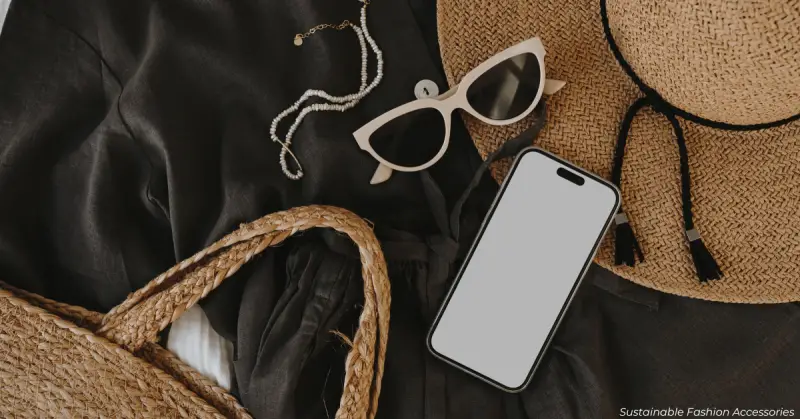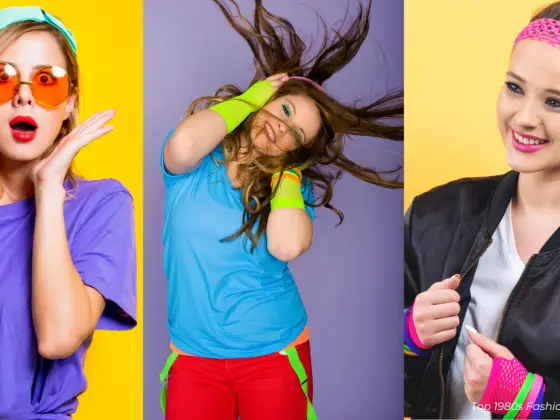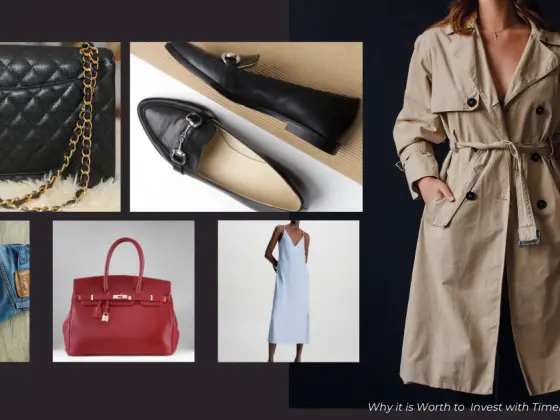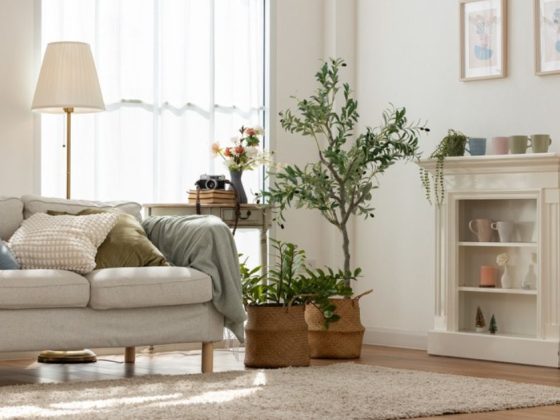
Fashion accessories like statement necklaces, sleek handbags, and cozy scarves add personality to any outfit but often come with environmental costs. Traditional accessory manufacturing can be resource-intensive, using harmful chemicals and materials from unethical sources and contributing to waste.
Choosing sustainable fashion accessories is crucial. They minimize environmental impact and support fair labor practices, letting you express your style while helping the planet. As the fashion industry shifts towards eco-consciousness, sustainable accessories offer a way to reduce the industry’s environmental footprint with ethically sourced jewelry and upcycled handbags.
Advantages of Choosing Sustainable Fashion Accessories
Investing in sustainable fashion accessories is about more than just making an eco-friendly choice; it’s about reaping a wide range of benefits that extend from your wardrobe to the broader world:
- Minimized Environmental Footprint: By opting for accessories made from organic, recycled, or renewable materials, such as organic cotton, recycled metals, or upcycled fabrics, you reduce your contribution to the environmental degradation caused by traditional production methods.
- Responsible Production Practices: Many sustainable brands prioritize transparency in their production processes, ensuring workers are paid fairly and operate safely and humanely. Ethical production supports both human rights and environmental conservation.
- Long-Lasting Quality: Sustainable accessories are often crafted with quality and durability in mind. Rather than follow fleeting trends, these pieces are timeless and built to last, meaning you won’t need to replace them as often, saving you money in the long run while reducing waste.
- Distinctive and Customized: Sustainable fashion brands often focus on smaller, artisanal production, which allows for more unique and customizable pieces. From handmade jewelry to personalized leather goods, sustainable accessories can stand out as distinctive, unique items that reflect your style.
- Fostering Positive Impact: When you choose sustainable fashion accessories, you’re actively supporting a movement toward ethical and eco-conscious practices. Your purchases help grow a more sustainable fashion industry, encouraging more brands to adopt greener and fairer approaches.
Trendy Materials for Sustainable Fashion Accessories
An essential part of sustainable fashion accessories is the materials used to create them. Innovative and eco-friendly materials are becoming more mainstream, offering both style and sustainability. Popular sustainable materials include:
- Recycled Materials: Upcycled fabrics, recycled plastics, and reclaimed metals provide new life to discarded items, transforming waste into something beautiful and functional.
- Organic Fibers: Natural fibers like organic cotton, hemp, and bamboo are grown without pesticides and need less water, making them gentler on your skin and the planet.
- Ethical Metals: Fair Trade-certified gold, silver, and other precious metals from responsible mines protect the environment and human rights, offering you high-quality jewelry with a conscience.
- Vegan Leather Alternatives: Plant-based leather options, such as those derived from cork, pineapple leaves (Piñatex), or even mushrooms, offer a cruelty-free and sustainable alternative to traditional animal leather.
- Natural Materials: Accessories crafted from natural elements like wood, stone, and bamboo can bring a timeless, earthy elegance to your wardrobe while promoting environmental conservation.
Sustainable Accessory Ideas for Every Wardrobe
Sustainable accessories can elevate your style for any occasion while being eco-friendly. Here are some versatile ideas:
- Handcrafted Jewelry: Opt for jewelry made by local artisans from recycled or ethically sourced materials. These pieces often tell a story and can serve as conversation starters about sustainability.
- Upcycled Bags: Transform secondhand clothing, discarded fabrics, or materials like seatbelts and tarps into stylish and durable handbags. These bags look chic and make a strong statement about the value of reuse.
- Ethical Scarves: Scarves made from organic cotton, hemp, or recycled polyester are perfect for adding texture and color to any outfit while remaining eco-conscious.
- Sustainable Belts: Choose belts crafted from innovative materials like cork or vegan leather that look as luxurious as traditional belts but are far kinder to the planet.
- Eco-Friendly Hats: Whether made from recycled materials or natural fibers, a well-made sustainable hat is perfect for both style and sun protection, all while supporting ethical production practices.
Tips for Finding Sustainable Accessories
Sustainable fashion can be overwhelming, but you can make more informed choices with some guidance. Here are some tips to help you identify genuinely sustainable accessories:
- Do Your Research: Look into brands prioritizing transparency detailing their sourcing, production methods, and sustainability certifications on their websites. Certifications such as Fair Trade, Global Organic Textile Standard (GOTS), and OEKO-TEX can help assure you of a brand’s commitment to sustainability.
- Examine the Materials: Choose accessories made from sustainable materials like recycled plastic, organic cotton, or vegan leather, avoiding harmful alternatives.
- Support Local and Small-Scale Artisans: Shopping from local designers or smaller, independent brands often ensures your accessory is handcrafted and ethically produced.
- Consider Pre-Loved Options: Thrift stores, vintage shops, and online marketplaces offer an excellent selection of secondhand accessories that are both stylish and sustainable.
Tips for Embracing Eco-Friendly and Sustainable Fashion Accessories
Shifting to eco-friendly and sustainable fashion accessories doesn’t mean sacrificing style; it’s about making more mindful choices that positively impact the planet. Whether you’re a seasoned conscious shopper or just beginning to explore sustainable fashion, here are some comprehensive tips to guide you toward a more responsible wardrobe:
Invest in Quality Over Quantity
Rather than filling your closet with cheaply made, fast-fashion items that quickly lose shape or appeal, focus on buying fewer, higher-quality pieces. Quality garments are crafted with durability in mind, ensuring they can endure years of wear without falling apart. Although these items may have a higher upfront cost, the longevity of well-made clothing ultimately saves you money in the long run. Timeless pieces are versatile staples beyond trends.
Prioritize Organic and Recycled Materials
Selecting organic and recycled clothing helps reduce your environmental impact. Fabrics like organic cotton, hemp, and linen are grown without harmful pesticides or excessive water use, making them gentler on the earth. Similarly, recycled materials such as repurposed polyester, plastic, and wool help divert waste from landfills and reduce the demand for virgin resources. The next time you’re shopping, look for tags that highlight the use of these eco-conscious fabrics. The more we support these options, the stronger the demand for sustainable materials becomes.
Support Brands Committed to Sustainability
It’s essential to research the brands you buy from, ensuring they align with sustainable values and ethical labor practices. Many brands today are transparent about their production methods, often obtaining certifications that indicate their commitment to sustainability and human rights. Seek out Fair Trade labels, ensuring fair wages and safe working conditions, or GOTS (Global Organic Textile Standard) labels, confirming sustainable and organic fabric production. B Corp certification is another mark of companies balancing purpose and profit, meeting the highest social and environmental performance standards.
Embrace the World of Secondhand Shopping
One of the most eco-friendly approaches to fashion is embracing the treasure trove of secondhand and vintage clothing. Shopping at thrift stores, vintage shops, or online marketplaces like Poshmark and Depop extends the lifecycle of garments. It keeps them out of landfills. Secondhand shopping also allows you to discover unique pieces you won’t find in mainstream stores. Not only do you save money and find distinctive fashion, but you also contribute to a more circular fashion economy that prioritizes reuse over waste.
Explore Renting or Borrowing Clothes
If you have an event or special occasion, consider renting or borrowing clothes rather than buying something new that you may only wear once. Several online services, such as Rent the Runway, let you rent designer outfits and accessories for a fraction of the retail price. This approach lets you try new styles without owning them, reducing fashion waste and keeping your wardrobe clutter-free. Borrowing clothes from friends or family is another sustainable option, particularly for formal events where you may want to avoid investing in a new outfit.
Take Proper Care of Your Clothing
Sustainable fashion involves both purchasing wisely and caring for your clothes properly. Extending the lifespan of your clothes through proper maintenance can significantly reduce your need to replace items. Always follow the care instructions on labels, and where possible, wash your garments in cold water to save energy and prevent fabrics from shrinking or wearing out prematurely. Mending minor damages, such as fixing a button or repairing a seam, is another simple way to keep your clothes in good condition. Proper storage, such as folding delicate fabrics and hanging structured garments, will help preserve their shape and quality over time.
Stay Educated and Informed
Sustainable fashion is constantly evolving, with innovations and practices always emerging. To stay informed, take advantage of workshops, webinars, and online courses focusing on sustainable fashion and eco-friendly living. Many platforms, such as Yellowbrick, offer educational resources to help deepen your understanding of ethical fashion practices. Stay updated to make informed consumer decisions and advocate for sustainability.
The Impact of Small Changes
Every conscious fashion choice you make helps promote sustainability and eco-friendliness. While the transition to sustainable fashion may seem overwhelming initially, even small changes can significantly impact over time. By prioritizing quality over quantity, choosing ethical materials, supporting sustainable brands, and caring for your clothing, you can reduce your environmental footprint while promoting positive change in the fashion industry. Remember, your efforts and those of others help drive the fashion industry toward a more responsible and eco-conscious future.
The future of fashion, including accessories, is sustainable. By making eco-friendly and ethical choices in your accessory shopping, you can take meaningful steps toward a more responsible and stylish wardrobe. Whether embracing innovative materials, supporting local artisans, or opting for upcycled pieces, sustainable accessories offer a unique way to reduce environmental impact while still making a bold fashion statement. Together, we can champion a fashion industry that values style and sustainability, ensuring a brighter future for the planet and future generations.















